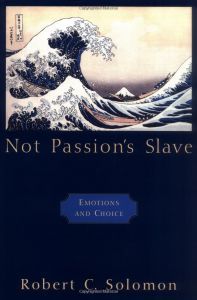不做情绪的奴隶
English Name: Not Passion's Slave
Hardcover: 280 pages
Publisher: Oxford University Press, USA (January 30, 2003)
Language: English
ISBN-10: 0195145496
ISBN-13: 978-0195145496
Product Dimensions: 9.6 x 6.4 x 0.8 inches
Shipping Weight: 1.2 pounds
"Solomon's work makes an important contribution to the attempt to move beyond the divorce between emotion and reason, a divorce embraced by both Hume and Kant, albeit in radically different ways. The strength of Solomon's arguments certainly provide robust support not only for his cognitive theory of the emotions but also for this contention that virtually all of our experience is to some degree affective."--Kevin E. O'Reilly, The Review of Metaphysics
The idea that we are in some significant sense responsible for our emotions is an idea that Robert Solomon has developed for almost three decades. Here, in a single volume, he traces the development of this theory of emotions and elaborate it in detail. Two themes run through his work: the first presents a "cognitive" theory of emotions in which emotions are construed primarily as evaluative judgments. The second proposes an "existentialist" perspective in which he defends the idea that, as we are responsible for our emotions. Indeed, sometimes it even makes sense to say that we "choose" them. While the first claim has gained increasing currency in the literature, his claim about responsibility for emotions has continued to meet with considerable resistance and misinterpretation. The new emphasis on evolutionary biology and neurology has (mistakenly) reinforced the popular prejudice that emotions "happen" to us and are entirely beyond our control. This volume is also a kind of intellectual memoir of Solomon1s own development as a thinker. The essays written in the 1980s elaborate the themes of the "intentionality" of emotion and the claim that emotions are "judgments"; in this period, he is also increasingly preoccupied with how emotions vary and are identified in a variety of cultures. In the 1990's, his interests evolve to consider the social and political role of emotions and theories about emotion. The final section presents his current philosophical position on the seeming "passivity" of the passions. Despite his own critical assessment of his earlier work, he continues to argue that, in the final analysis, we are responsible for our emotions and existential quality of our lives.
英文版:
附件列表
词条内容仅供参考,如果您需要解决具体问题
(尤其在法律、医学等领域),建议您咨询相关领域专业人士。
如果您认为本词条还有待完善,请 编辑
上一篇 高效能人士的七个习惯 下一篇 瓶中信

